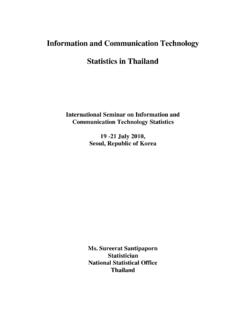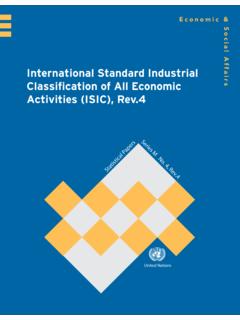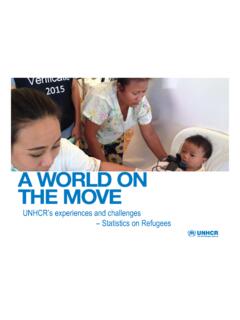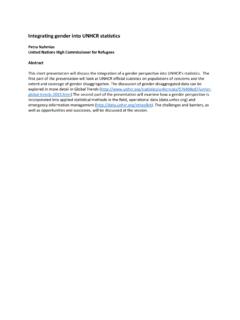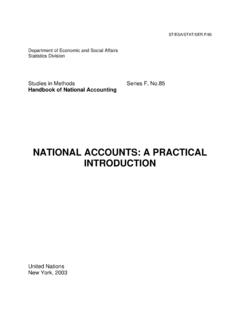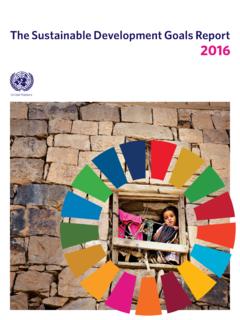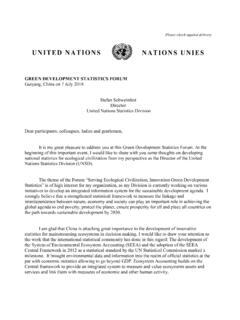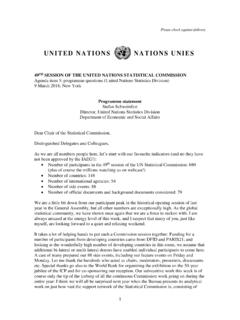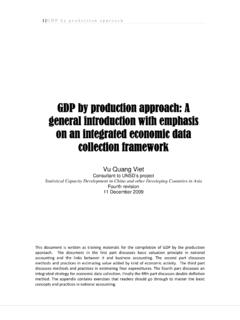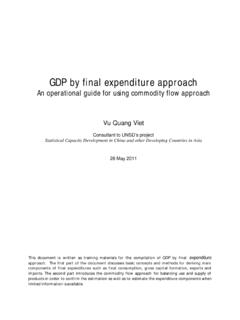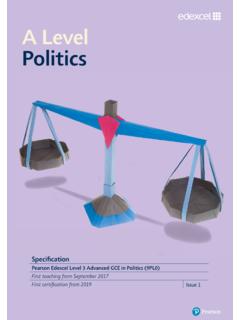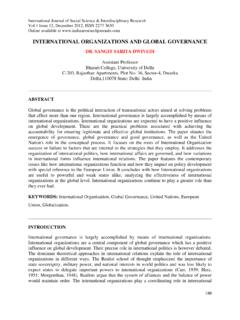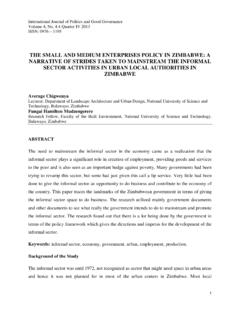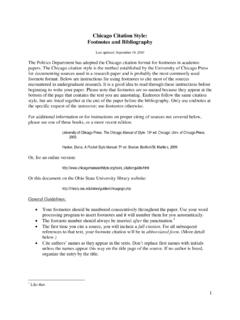Transcription of MONITORING PARTICIPATION OF WOMEN IN POLITICS …
1 MONITORING PARTICIPATION OF WOMEN IN POLITICS IN NIGERIA Paper presented by Mrs. Oloyede Oluyemi National Bureau of Statistics (NBS, Abuja, Nigeria) ABSTRACT Nigeria has been recording low PARTICIPATION of WOMEN in both elective and appointive positions. This is a growing concern to many Nigerians. However, concerted efforts have been made by government and non-governmental organizations to increase the level of PARTICIPATION of WOMEN in POLITICS in line with the declaration made at the fourth World Conference on WOMEN in Beijing, which advocated 30% affirmative action. In Nigeria, the extant National Gender Policy (NGP) recommended 35% affirmative action instead and sought for a more inclusive representation of WOMEN with at least 35% of both elective political and appointive public service positions respectively.
2 The under representation of WOMEN in political PARTICIPATION gained root due to the patriarchal practice inherent in our society, much of which were obvious from pre-colonial era till date. However, the re-introduction of democratic governance has witnessed once again an increase in WOMEN political PARTICIPATION both in elective and appointive offices. The national average of WOMEN s political PARTICIPATION in Nigeria has remained percent in elective and appointive positions, which is far below the Global Average of percent, Africa Regional Average of percent and West African Sub Regional Average of 15 percent. For instance, out of the 36 recently confirmed ministerial appointments by the administration now in power, only six (6) are WOMEN , representing percent.
3 In the National Assembly, WOMEN constitute percent of members of the House of Representatives and percent of the Senators. Also with the fifteen years of uninterrupted democratic governance (1999-2015), Nigeria is yet to produce a female governor in any of the 36 states of the Federation. This paper seeks a critical review of the importance of data in MONITORING WOMEN PARTICIPATION in POLITICS in Nigeria vis- -vis the affirmative declaration. Recently, the National Center for WOMEN Development embarked on the collection of a national data on involvement and PARTICIPATION of WOMEN in POLITICS in Nigeria (1999 to 2015). One of the objectives of the data collection is to provide a baseline for the implementation of the new Sustainable Development Goals (SDG).
4 The data collation of the exercise is ongoing. Hopes are high that the result will show the progress steadily made to achieving the affirmative declaration and determine how the gap that erstwhile existed has been closed as well as measure the variation between where we are and the affirmative action of 35 percent. Also, it will improve evidence-based planning and programming involving WOMEN in decision making; increase the support of key stakeholders on measures to increase representation of WOMEN in decision-making and further improved awareness of new advocacy tools among stakeholders to support the campaign for increased representation of WOMEN in decision making in Nigeria. KEYWORDS: Gender Equality, POLITICS , WOMEN , Electoral Process, Patriarchal, Political activist and political PARTICIPATION .
5 INTRODUCTION Under international standards, both men and WOMEN should have equal rights and opportunities to everything worldwide, most especially to participate fully in all aspects and at all levels of political processes. Globally, WOMEN constitute over half of the world s population and contribute in vital ways to societal development generally. In most societies, WOMEN assume some key roles, which are: mother, producer, home-manager, and community organizer, socio-cultural and political activists. Of these many roles mentioned, the last has been engendered by WOMEN movement. In line with global trend, Nigerian WOMEN constitute nearly half of the population of the country.
6 But despite the major roles they play with their population, WOMEN roles in the society are yet to be given recognition. This is due to some cultural stereotypes, abuse of religion, traditional practices and patriarchal societal structures. In Nigeria the awareness about the role of WOMEN in development of a nation came up in 1980s. The International Conference on WOMEN in Beijing in 1995 enhanced the effective PARTICIPATION of WOMEN in POLITICS in Nigeria. In Nigeria, about 51 percent of WOMEN are involved in voting during elections. Despite these, WOMEN are still under represented in both elective and appointive positions. Available statistics revealed that overall political representation in government of Nigeria is less than 7 percent (Agbalajobi, 2010).
7 This shows that Nigeria has not attained 30 percent affirmative as prescribed by the Beijing Platform of Action. Nigeria has been recording low PARTICIPATION of WOMEN in both elective and appointive positions this is a growing concern to many Nigerians. However, concerted efforts have been made by government and non-governmental organizations to increase the level of PARTICIPATION of WOMEN in POLITICS , in line, with the declaration made at the fourth World Conference on WOMEN in Beijing, which advocated 30% affirmative action. However, in Nigeria, the extant National Gender Policy (NGP) recommended 35% affirmative action instead and sought for a more inclusive representation of WOMEN with at least 35% of both elective political and appointive public service positions respectively.
8 The under representation of WOMEN in political PARTICIPATION gained root due to the patriarchal practice inherent in our society, much of which were obvious from pre-colonial era till date. However, the re-introduction of democratic governance has witnessed once again an increase in WOMEN political PARTICIPATION both in elective and appointive offices in Nigeria. OBJECTIVES: This paper seek a critical review of the importance of data in MONITORING WOMEN PARTICIPATION in POLITICS in Nigeria vis- -vis the affirmative declaration. Also examine factors militating against WOMEN PARTICIPATION in POLITICS vis- -vis the socio-religious and economic limitation place upon them, despite the raising advocacy platform to ensure greater inclusion of WOMEN in POLITICS .
9 HISTORICAL BACKGROUND Pre-colonial era Politically, in the pre-colonial era, Nigerian WOMEN were an integral part of the political set up of their communities. For instance, in pre-colonial Bornu, WOMEN played active roles in the administration of the state, complementing the roles played by male counterparts. Also, WOMEN also played a very significant role in the political history of ancient Zaria. The modern city of Zaria was founded in the first half of the 16th century by a woman called Queen Bakwa Turuku. She had a daughter called Amina who later succeeded her as Queen. Queen Amina was a great and powerful warrior. She built a high wall around Zaria in order to protect the city from invasion and extended the boundaries of her territory beyond Bauchi and she made Zaria prominent Commercial Centre.
10 The story was not different in ancient Yorubaland, where Oba ruled with the assistance of a number of WOMEN referred to as female traditional chiefs. They consisted of eight titled ladies of the highest rank. The significant role played by prominent WOMEN such as Moremi of lfe, Emotan of Benin and Omu Okwei of Ossomari, cannot be ignored. Moremi and Emotan were great amazons who displayed wonderful bravery and strength in the POLITICS of lfe and Benin respectively, while Omu Okwei dominated the commercial scene of Ossomari in present day Delta State. The table below shows the statistics of WOMEN traditional rulers in the Pre-colonial days in Nigeria. Table 1: Statistics of WOMEN Traditional Rulers in Pre-colonial days.
